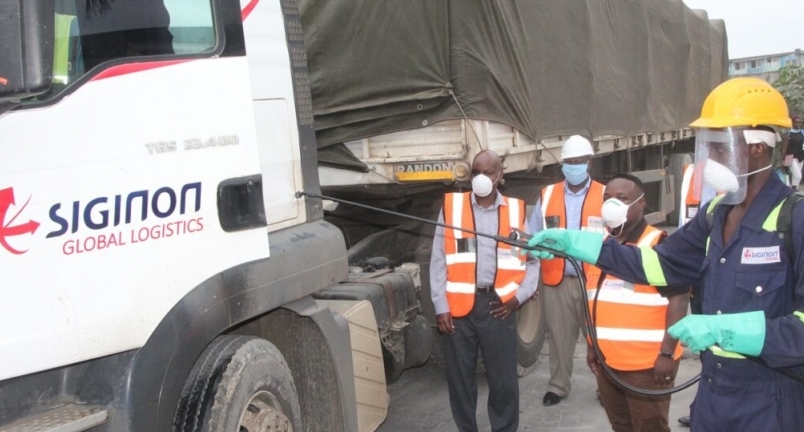The ‘New Normal’ in cargo logistics
The urgency of keeping the supply chains going is further underscored by a UNCTAD report titled, “Covid-19: A 10-Point Action Plan To Strengthen International Trade And Transport Facilitation In Times Of Pandemic”.

The advent and growing cases of the Covid-19 infections have forced all of us to adjust our lifestyles to accommodate the safety guidelines, says Ruth Nduta, group marketing and communications manager of Siginon Group. Since the first case was identified in Wuhan, China, no continent has been spared by the spread of the pandemic which is currently making itself felt in Africa. The impact of the Covid-19 has threatened economies, livelihoods and life as we knew it due to the various interventions taken by governments such as lockdowns, curfews that strangled business and trade flow.
Certain essential sectors of the economy, such as the transport and logistics industry have been permitted to continue operations to move essential supplies locally and on the cross border. Most of these supplies comprise of food, medical supplies and personal protective equipment (PPEs) which not only ensures the population is well resourced with key supplies but also support medical practitioners and governments in the war against the virus.

Ruth Nduta, Siginon Group
The urgency of keeping the supply chains going is further underscored by a UNCTAD report titled, "Covid-19: A 10-Point Action Plan To Strengthen International Trade And Transport Facilitation In Times Of Pandemic". The report asserts that facilitating trade and the transport of goods has become more important than ever, to avoid logistics obstacles that lead to shortages of necessary supplies. The report details key steps that government and private sector must embrace to keep the flow of trade even in these challenging times. Notable recommendations include - uninterrupted shipping, keeping ports open, going paperless, facilitating cross border transportation, right of transit among others.
Unfortunately, the cargo transportation sector has been pointed out as a major avenue for the spread of the virus to the masses in the course of business. This is partly attributed to the popularity of the Port of Mombasa as a regional business hub thus attracting over 2,000 transporters from various East African nations. To stem the spread of the virus, transporters have been urged to realign the way they conduct their operations to minimise exposure to the virus by their teams and communities while transporting goods.
Due to the risks involved, and seemingly amorphous nature of infections, logistics players have stepped up their game to stem the spread of the virus. Today, frequent sensitization of teams involved in cargo handling is done daily and as passionately as the road safety 'toolbox' talk before embarking on the journey. The message of social distancing is reinforced to trucking teams urgently and repeatedly to encourage the need to observe social distance even as they take breaks along the journey. In rest areas, the trucker's camaraderie is now enjoyed one metre apart in cognizance of the risk exposure by lack of personal space. Hi fives, fist bumps and hugs have now been replaced with a modest Namaste, waves and other safer acknowledgements to limit direct contact. With government regulations demanding the closure of most overnight accommodation along the highways, in-cabin accommodation, within the truck, is now the preferred option to give truckers some control on their environment. Together with route plans and recommended PPES, sanitisers, gloves and masks have now made it to the mandatory trip resources per trucker. Repeated sterilisation of the truck and the driver is now akin to a standard operating procedure (SOP) to mitigate the risks arising from the trucking sector being a catalyst in moving the virus alongside the highways. For those going cross border, there is now compulsory Covid-19 testing conducted by the respective governments to ensure they identify and attend to those displaying signs of infection while protecting their populace.
Access to most premises is now more controlled and more rigorous than before. Today, it is not only limited to security screening but also includes compulsory temperature checks, use of sanitisers as well as limited to those wearing protective face masks. Services that were previously offered through direct interaction have now been transferred to email, telephone, and web services where ever possible. Supporting government arms have also adopted similar approaches moving their services to online platforms as well as resourcing their staff with PPEs where physical interventions must be required.
It is not in doubt that life after the dark Covid-19 tunnel will never be the same again. Each economic sector should interrogate itself to identify areas where they can preempt and protect against the spread of the Covid-19 pandemic, a joint relentless effort will bear fruits even as the challenges seem insurmountable. It is the World Health Organization (WHO) operations support and logistics chief Paul Molinaro who aptly summarised that "We're sort of sailing the ship while building it at the same time. Right now we have a ship, and there's a lot of holes in it. But we have a ship." It's a new normal.


